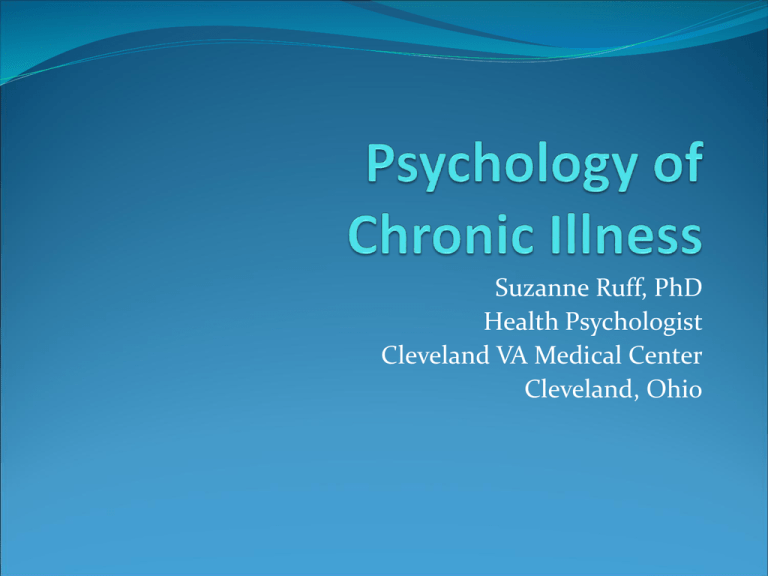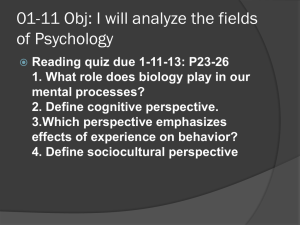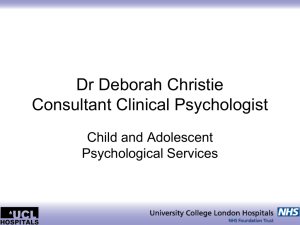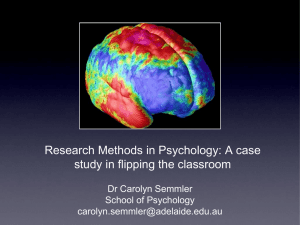Psychology of chronic illness
advertisement

Suzanne Ruff, PhD Health Psychologist Cleveland VA Medical Center Cleveland, Ohio Chronic Medical Conditions There are three tasks in managing a chronic medical condition Care for your condition, learn about your condition Manage any emotional changes that your condition may bring about Return to your pre-diagnosis life as fully and as soon as possible Partner with your medical caregivers and your family and friends Stages of diagnosis Pre-diagnosis Anxiety Signs and symptoms not recognized YOU know there is something wrong Medical providers may not know what is wrong You may begin to second guess yourself – especially in a condition with varying symptoms Anger You can’t do what you used to do You want your life back Stages of diagnosis Diagnosis Relief It’s not all in my head Anxiety Can be heightened – especially with relatively rare condition Diagnosis known, but prognosis uncertain Anger “Why me?” Depression Later in time Stages of diagnosis After diagnosis, mood varies with: acuity of disease, number and severity of flares support available medical care available ability to return to life before diagnosis 1978 study on mood variation with significant event Spinal cord injury Winning the lottery Stages of diagnosis Most people return to their baseline mood about a year after injury or winning the lottery Psychology of chronic illness What does this mean to patients with a chronic medical condition? Chronic medical conditions can lead to depression over time Often unrecognized Overlap of symptoms No pathognomic feature in depression Most common is anhedonia, not a sad mood Lack of restorative sleep, daytime fatigue Cognitive changes Diagnosis and treatment Recognize symptoms Mood, somatic symptoms, cognitive symptoms, Anhedonia Relationships Activities Meaning and purpose in life Seek responsible treatment Partner with your medical providers and especially MG provider Think about therapy rather than medications Psychological therapies Cognitive Behavioral Therapy Cognitive Processing Therapy Narrative Therapy Acceptance and Commitment Therapy Positive Psychology Therapy Combination therapies Partner with your providers Positive Psychology Martin Seligman, PhD, University of Pennsylvania founded the field of Positive Psychology in the late 1990’s He first studied “Learned Helplessness” in the 1960’s He then turned to “Learned Optimism” President of APA A return to what is right with people Formed a panel to study happiness Phenomenally successful Positive Psychology Define happiness – essentially a sense of well-being Not hedonism, not about material things Must be measurable and changeable Deconstructed the unwieldy term of happiness into: Positive emotion Purpose Engagement Positive relationships Positive accomplishments Positive Psychology Positive emotions Studied by Barbara Fredrickson, PhD at UNC Positivityratio.com Measures positive emotion to negative emotion ratio FREE! Positive character strengths Community involvement – values in action Positive Psychology Positive emotion Broaden and build theory Broaden Positive emotions lead to more flexible thinking Positive emotions lead to more expansive vision Positive emotions lead to more creative thinking Build Positive emotions build stronger relationships Positive emotions build emotional reserves Positive emotions build future protection Positive Psychology Most studied positive emotion Joy Love Inspiration Humor Awe Pride Tranquility Gratitude Interest Hope Positive Psychology Increase positive emotions and decrease negative emotions Gratitude journal Develop new interests Deepen current interests Mindfulness Savor positive events, conversations, Distraction when negative thoughts occur Defuse negative ‘landmines’ Positive Psychology Purpose and engagement Positive character traits Panel formed to look for universal character strengths Ubiquitous character strengths What enables a community or culture to survive and flourish? Read philosophical, religious, and historical works Six meta traits Wisdom Humanity Courage Temperance Justice Transcendence Positive Psychology Authentichappiness.org Take the VIA test – long version FREE! Your top 5 strengths WISDOM - Love of learning, perspective HUMANITY - Love, kindness COURAGE - Persistence, vitality TEMPERANCE – Prudence, self-regulation JUSTICE – Leadership, fairness TRANSCENDENCE – Humor, spirituality Positive Psychology “Bloom where you’re planted” or increase the Big Five The Big Five Gratitude Curiosity Hope/optimism Appreciation of beauty and excellence Vitality Jumped categories – from transcendence to courage Positive Psychology How to become depressed Dwell on the negative Lose interest in most things and people Become convinced that negative things are permanent, pervasive, and not under your control Lose your sense of wonder Stop moving Not exercising is like taking a “depressant” Compare these to the Big Five Positive Psychology Positive relationships and positive accomplishments Most easily achieved through use of your strengths Family, friends, social circles Community involvement Work, volunteering What are your values? What are you committed to? What makes your heart beat faster? What makes you get up in the morning? What drives you? Stages of Change Pre-contemplation Contemplation Planning Action Maintenance Identify, target, make a plan and carry it out Stages of Change Life balance What do you value? Pillars of life Family Intimate relationship Friends Community involvement Spiritual life Work, volunteering Hobbies, fun Learning/growing Physical health Physical space _____________ Stages of Change Identify your values How are you actually spending your time? How would you like to spend your time? Target areas for change What is balanced? Keep those What is necessary? Be realistic What would you like to change? Make a plan Plan for change and maintenance Stages of Change Life balance worksheet, part 1 Average day or week Difficult to do unless you carry sheet around – memory is not great for this type of activity Life balance worksheet, part 2 + column, - column, = column Maintain – no stealing from balanced row Life balance worksheet, part 3 Make a plan Be realistic, flexible, positive Positivity Positivityratio.com 10 questions on positive emotions 10 questions on negative emotions 1 point assigned for any negative emotion Due to negativity bias 1 point assigned for any positive emotion experienced at a moderate level 3:1 ratio is associated with flourishing Positive Psychology Very promising new field for Positive Health Not absence of disease Strong results with studies involving literally hundreds of thousands participants in Health Psychology Empowering Needs to be personalized Positive steps Keep a gratitude journal Savor the good times Use the Life Balance chart to help you decide where to spend your time Get involved with what or who you love Pace yourself Use some of your “good” days to spend in pleasurable and meaningful activities Be active Keep it up!








